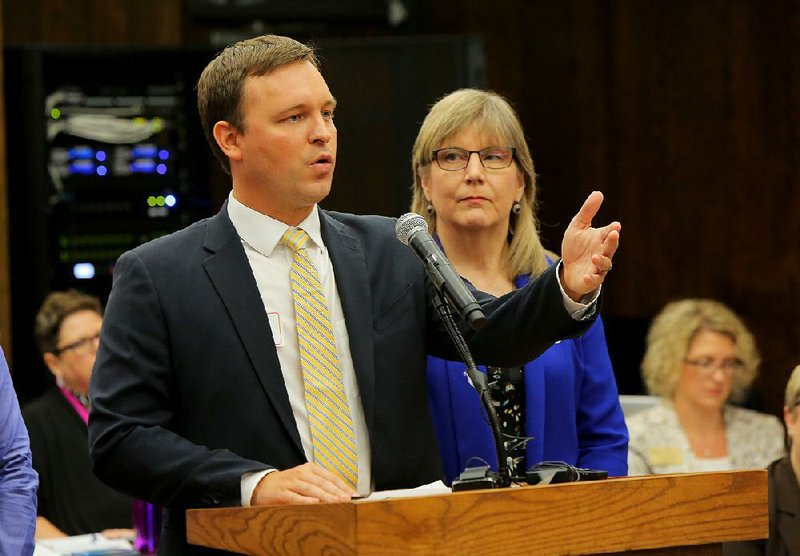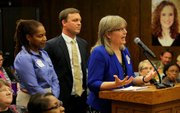The Arkansas Board of Education voted unanimously Thursday to accept the vision and recommendations made by the Forward Arkansas initiative to improve education to the point that every student is successful in college and careers, and the state becomes a national leader.
RELATED ARTICLE
http://www.arkansas…">State Board of Education Notebook
Education Board members called the work of the partnership between them and two philanthropic organizations a "huge" and "defining moment" in the state's history of education.
The Walton Family Foundation and the Winthrop Rockefeller Foundation are the organization partners in the initiative that delved into everything from healthy school breakfasts, to the timing of annual school elections, to pay incentives for teachers in high-need subjects and schools, to the structure of the Arkansas Department of Education so it can best support and be held responsible for academically struggling schools.
"This has been my dream," Education Board member Vicki Saviers of Little Rock said. "I never expected to see it in my lifetime. I know the hard work is beginning now but with the leadership that you all have shown, I have no doubt that we will sustain the momentum. This is a huge moment in time for the state of Arkansas."
The 56 pages of aspirations and recommendations -- some long-term and some "quick wins" -- were developed with guidance from a 28-member steering committee of educators, government leaders, civic leaders and business people. Hugh McDonald, president and chief executive officer of Entergy Arkansas, was the committee chairman. Jared Henderson, head of Teach for America in Arkansas, was the project manager for Forward Arkansas.
Henderson said the work started about a year ago to develop a shared vision and road map for education excellence.
"That's what we achieved," he said, adding that the year produced recommendations that, if executed, "will lead to excellence in opportunity, and 21st century preparedness for every child in the state regardless of where they are born and which school district they are currently in."
Valuable and distinctive from what has happened in other states, Henderson also said, is the diversity of the group of individuals in terms of where they live and their professions.
"We've all learned a lot from each other and we've just been inspired by the ideas people have had and the passions for the overall goal."
The work of carrying out the recommendations over five, 10 or 15 years will be delegated in part to the Implementation Working Group, made up of many of the same members that are on the steering committee. David Rainey, a former school district superintendent and state legislator, will chair that committee. Initiative leaders also envision the hiring of a full-time initiative director. Quarterly reports on carrying out efforts will be made to the Education Board.
The Forward Arkansas recommendations call for expanded, high quality prekindergarten programs, breakfast as part of the school day, after-school and summer programs for pre-kindergarten through high school students, telemedicine services for students, workforce education courses that provide students with career opportunities, adequate broadband access for schools, effective teacher training and coaching, and streamlining of teacher and principal duties to allow them to focus on instruction.
There are recommendations calling for innovations such as year-round school, extended learning time and looping classrooms in which students have the same teacher for more than one year. One of the recommendations calls for moving annual school elections to coincide with state elections.
Still other recommendations deal with school leadership and teacher salaries, including incentives and higher salaries for teachers who work in high-need subjects and geographical areas.
A large part of the report focuses on schools and districts that are categorized as academically distressed or on the verge of academic distress and how the Arkansas Department of Education structure should include a unit devoted to working with those schools and districts.
The state-labeled schools should be evaluated and the evaluations should result in "binding recommendations that are created with input from the school leaders. A "turnaround academy" should be established to give teachers and leaders the specific skills for being successful in turning around troubled schools.
Decisions to take over a school or districts should be "case dependent" and made if leaders demonstrate an inability to implement improvements. Decisions to exit academically distressed schools from state control "should be made on a case-by-case basis but should occur as soon as the school has met the agreed upon performance threshold and demonstrated sustained progress implementing the recommendations in its comprehensive evaluation," the plan says.
Education Board members and Education Commissioner Johnny Key welcomed the aspirations and recommendations, as well as the call to continue with the efforts. Part of that is expected to invite communities and school districts to identify themselves as "Forward Communities" and carry out the recommendations.
"I'm so thrilled to see the Forward Communities," board member Saviers said. "We can't just do things to people. Everybody has to be involved. Using a little bit of my bully pulpit, I hope communities across the state will take up the banner. This will do nothing but improve lives for people in your communities. I am saying today that 20 years from now we will look back on this moment and look at this plan and say we did it. We are capable of creating a vision for education and we're capable of implementing that vision."
Board member Jay Barth of Little Rock highlighted the spirit of compromise demonstrated in the recommendations.
"I think we have made progress in education in the state because we have treated it in a nonpartisan manner. We should all celebrate this process as our best hope for continuing that momentum, moving forward," Barth said. "I just want to celebrate the compromise that we have seen at the heart of some of this."
Barth said he liked "98 and one-half percent" of the recommendations but had some concern about the proposal to change the school elections, now in September, to coincide with general elections. He questioned whether school district millage proposals will get lost on a lengthy general election ballot, jeopardizing the districts financial health.
Board member Diane Zook of Melbourne questioned whether the cost of the recommendations -- particularly those dealing with the Arkansas Department of Education -- would be borne by the foundation partners or state taxpayers.
Kathy Smith of the Walton Family Foundation said it is possible that there be a reallocation of current funds in the agency. She also said the organizations want to work with the state agency to do whatever is best.
Zook suggested that the elections is a divisive issue that needed to be resolved to pave the way for carrying out other recommendations.
Henderson said there is no plan as yet for resolving the matter but "we're putting ourselves on the hook to make sure a plan is developed."
Zook made the motion to accept the initiative's work.
Education Board member Mireya Reith of Fayetteville said she continued to be delighted with the work of the initiative.
"I still feel that a lot of leadership and conversation has been very centralized around the state level," she said and called for local communities to be encouraged to take ownership of the initiatives.
"People in general are going to get more involved if they feel like they have a place at the table," she said.
Key, the commissioner, said that agency leaders have been waiting on the initiative recommendations and the Education Board action to make any changes in the department. The recommendations will be included in the agency's own strategic planning and staffing decisions.
The agency's work will also include a comparison of the recommendations and the existing rules and laws, Key said.
"There are a lot of policy review items," he said. "The next step for us will be alignment. As the implementation team begins and continues its work, we'll work closely with them. Where there is not alignment we'll identify whether it is statutory, whether its in rules and regulations, or in practice. We'll bring those back to you for direction and approval."
Key called the work of the initiative a "generational shift" for Arkansas that can't be accomplished in a year, that it will be a "long haul," but "the momentum we start today will drive this forward."
Henderson said after the meeting that more than 8,500 Arkansans participated in the preparation of the recommendations through surveys, focus groups and expert interviews.
"Today's endorsement by the Arkansas State Board of Education is yet another step forward in the process," Henderson said. "We look forward to a continued partnership as we strive to implement these recommendations and work together to dramatically improve education in Arkansas."
Metro on 09/11/2015

